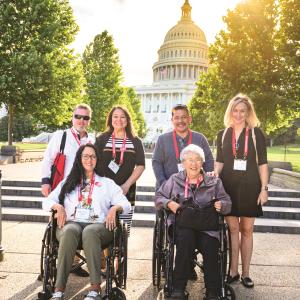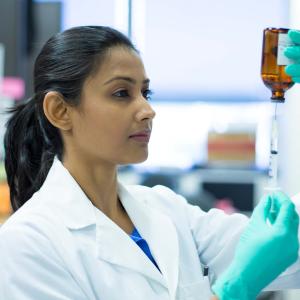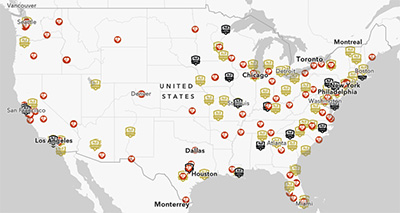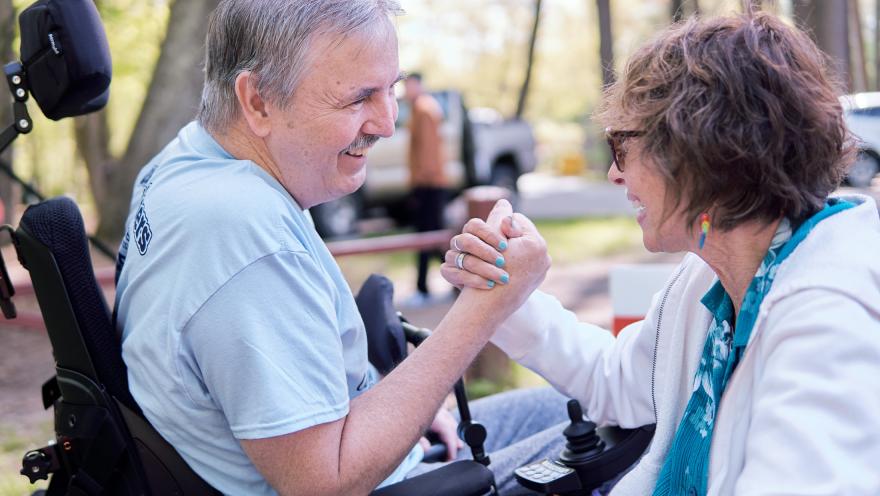Big data, by definition, refers to extremely large data sets that can be analyzed to reveal patterns, trends, and associations, especially relating to human behavior and interactions. For the ALS community, big data has the potential to expedite the work to make ALS a livable disease while ultimately finding a path to a cure.

On a recent Connecting ALS podcast episode, we spoke with Pam Knott, vice president of data and technology at The ALS Association, to learn more about how the Association is harnessing the power and potential of big data to speed up the process of empowering people to live longer lives, to access care, to bring new treatments to market, and to reduce the harmful impact associated with the disease.
The transcript below has been lightly edited for brevity and clarity.
What role do you see big data playing in terms of making ALS a livable disease?
I think data in general, and of course big data, plays a very important role. And for that word livable, in my opinion, there are two different sides of that. First, you have the research, so actually prolonging life, finding cures and treatments, finding causes, and hopefully preventions. An example would be the CDC registry. We collect data from people living with ALS so we can have more context around their lives to find trends, patterns, etc.
But the other side of being livable is the quality of life, enhancing the quality of life, easing the burdens as much as possible. That's really where my team is focused. Not necessarily the hard research, but the resources and the empowering tools that we can provide the community.

So knowledge is power, right? Data gets us to that knowledge. And for the empowering tools, especially, that knowledge should be as targeted and specific as possible to the person and their family so that they can make the right decision for them at the right time.
Also, for resources and improving quality of life, we have our advocacy and public policy efforts. Those efforts require evidence to bring to the table on why a certain bill related to Medicare should be passed, or why the FDA should approve a treatment quicker. So yes, data has a really big role, but we sometimes go right to the hard research. I think that there's a broad spectrum there and each side of that spectrum is just as important.
Data can really touch on the delivery of care, and some of the work being done to improve and enhance quality of life. What are some programs being driven by data? What are some day-to-day ways or things on the horizon that are really bringing data to life?
We are working collectively with our care services team and our communications team to build a tool that translates data into knowledge and action items for a person living with ALS and their family wherever they are along their journey, and in different ways and different levels. When you're first diagnosed, it's a lot to take in, and maybe you don't want to read a ten-page article at that moment. Maybe you just want a really quick video. Or maybe you just want to know, "Where can I find a group of people that I can talk to that's already gone through this that can support me?" So that's one of the tools we're working on, the patient journey map.
Again, technology, I lump data and technology together, because you have that information, but you also need a system or a process to help make it actionable. So this tool will be available in different formats. Folks can access it when they want to. If it's midnight and they can't sleep, they can access it then. Also, making the information as accessible and inclusive as possible. Just thinking about learning styles. So perhaps I'm a visual learner, but maybe somebody else is an auditory learner. So using tools to help expand the accessibility and inclusion as well is really important.

We also have an initiative that we are building out right now in our database using Salesforce for clinical trial matches. Right now it's a pretty big burden for people living with ALS to identify and understand what clinical trials are out there in the first place, and which ones they might be eligible for because there's a certain set of criteria for particular trials. That could be age, gender, location, how far along the disease has progressed, things like that. The tools available right now, at least the feedback that I've gotten, are daunting. There's a lot of filters to apply. Maybe you don't know the timing of a certain trial, if it's closed already or not, all that stuff.
We are partnering with companies who have trials, who are releasing trials. They have a certain trial recruitment window. Once we get the eligible criteria from those partners, and we understand the window of time for which they want to recruit, we can use the data already in our database to target folks that have the right eligibility requirements.
Let's say ‘trial A,’ the company is recruiting the month of July. In the month of July, we can build an automated email journey that grabs those folks with those particular data points and automatically send them an email, so they don't have to do anything. We are trying to take that burden off of them. They'll receive an email saying, "Hey, you might be eligible for this certain trial. If you're interested, click on this link to learn more and register." So that's one of the things that I'm really excited about, taking the burden away from the person and the family dealing with ALS.
And also what that will do is get recruitment for trials completed quicker, because that's really a bottleneck for trial recruitment is that the people living with ALS can't find the right trials and the trials can't find the right people. So hopefully we will be able to aid in that matchmaking process there.
What are some other exciting things that are happening in the world of data?
One really tangible area is geospatial data. This might be the best example of really making insights snap into focus. You actually see a picture. We've been putting a lot of resources towards mapping different layers of data, first and foremost to be an empowering tool for people living with ALS and their families to understand where the closest clinic is to them.
On the surface, that might not be a big deal. We have lists online already of the clinics in Alabama, the clinics in Arizona. But adding this additional visual of an actual map, again, going back to being as inclusive and accessible as possible, but it makes the insight easier and quicker to grasp, "Oh, I know exactly which one is closest to me, because there it is. I can see it on my computer screen."

Or the patient could be traveling, so maybe they're familiar with the clinic that's closest to their home, but they need to become familiar with those that are going to be the easiest to get to when they're on vacation or whatnot. So that's a really exciting tool that we just launched, the clinic locator.
Geospatial data also helps us at the Association understand where our gaps are, where we can do better. So maybe we map people living with ALS that we are serving at the moment, and we also map our clinics and other resources we have available in those areas. We can see that there's a really big gap where a lot of patients are, so perhaps that leads us to investigate working and establishing another clinic, or hiring additional care services resources, particularly in that area.
I will say that data is important because data leads to knowledge. But it's not just data; there are people behind that data. There are people creating the systems. There are people cleaning the data. There are people taking those insights and taking action with them. We couldn't do it without data, but additionally we couldn't do it without the people, the relationships, the integration, and the collaboration that is needed for understanding the comprehensive picture and getting the work done. Prioritizing the work and making sure that we are all headed in the right direction towards our mission.
CLICK HERE to listen to the full Connecting ALS podcast episode, Mining Data to Help Build a World Without ALS.
To continue to follow stories about people living with ALS in the community and learn more about the disease, subscribe to receive our weekly blogs in your inbox HERE or follow us at als.org/blog.


Join the conversation. Please comment below.